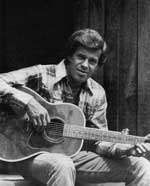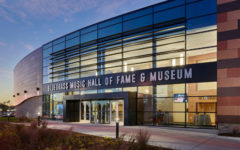Our UK correspondent, Richard F Thompson, remembers Benny Williams, and recounts his long, and largely unheralded career in bluegrass and country music.
 Benjamin Horace “Benny” Williams: March 28, 1931 – October 11, 2007.
Benjamin Horace “Benny” Williams: March 28, 1931 – October 11, 2007.
Benny Williams died earlier this month in St Thomas Hospital, Nashville, Tennessee, from natural causes. He was 76 years old.
One of bluegrass music’s unsung ‘Mr Versatiles,’ Williams was born on Dayton Mountain, Bledsoe County on the Cumberland Plateau of Tennessee. For nearly fifty years, he was noted as one of country music’s most accomplished musicians, singers and songwriters. During his career, he worked with such luminaries as Marty Robbins, Grandpa Jones, Jimmy Martin, Kitty Wells and Johnny Wright, Stonewall Jackson and others (see below). He was adept on autoharp, mandolin, guitar, banjo and, most notably, fiddle.
While still a teenager, Williams got his first job as a bluegrass sideman when he went to work with Mac Wiseman on the Old Dominion Barn Dance in Richmond, Virginia. Then, as a 25-year old, Williams was a member of the Tennessee Cut-Ups when Reno and Smiley were fully re-united after a brief break in the mid-1950s. Subsequently, he had a brief stint with the Stanley Brothers firstly, then with Lester Flatt and Earl Scruggs.
In 1961 Williams joined the Blue Grass Boy, playing guitar. Later he showed his versatility by switching to play the fiddle and he stayed with that instrument for most of the remainder of his time with Bill Monroe, which ended late in 1967.
He leaves a legacy in the form of contributions to many recordings made during the classic country and bluegrass music era.
In August 1956, during a 12-song recording session in Cincinnati, Williams played some cross-picked mandolin breaks – learned independently from Jesse McReynolds – on Never Get To Hold You In My Arms Anymore and mandolin or fiddle on other songs. These recordings are available on the 4-CD box set, Reno & Smiley and the Tennessee Cut-Ups 1951-1959 [King KBSCD 7001].
While with Bill Monroe, Williams participated in five sessions, two from November and December 1961 and three sessions from April and May 1962. In the first two sessions from 1961 he sang lead vocal on the chorus to Cotton Fields while playing either fiddle or guitar on all six cuts done during that year. Williams played fiddle on the nine cuts from the 1962 sessions.
These recordings can be found in their entirety on the Bear Family 4-CD box set, Bill Monroe and the Blue Grass Boys, 1959-1969 or a selection thereof as part of smaller samplings on Music Of Bill Monroe 1936-1994 CD [MCA 11048] and the instrumental collection American Traveler [County 119]
In one of the last sessions for Dot Records, circa February 1961, Williams played banjo on two cuts for Mac Wiseman. Later, playing mandolin, he participated in four sessions, during which 16 cuts were made, most of which appear on the Capital album Bluegrass Favorites, now available on CD [Music Mill 70036]. All recordings can be found on the Bear Family 6-CD box set ‘Tis Sweet To Be Remembered [BCD 15976].
At about that same time, Williams played on four sessions playing guitar on some tracks and vocal chorus on others for 14 Porter Wagoner cuts. These recordings are included in Bear Family box set The RCA Sessions: The Thin Man From West Plains [4 CDs][BCD 15499], while some are on Wagoner’s album in RCA Country Legends series [65102].
He can also be heard playing guitar on the more recent recordings for Darkness On The Delta the Kenny Baker/Bobby Hicks collaboration for County [2733].
Williams co-wrote I’d Like To Be Sixteen Again, I Buried My Future and Just Plain Yellow, the latter two with Jimmy Martin, who recorded them both at a March 1973 recording session. He also helped to write Past Is All The Future I See, a song that Stonewall Jackson recorded.
As well as being an innovative picker of the mandolin, Williams invented an eight-string guitar on which he played banjo-like rolls, drop-thumb guitar as well as in the Travis-style and after the style of Mother Maybelle Carter. Vocally he was gifted in being able to sing all four parts and do impersonations of well-known artists.
Doug Hutchens was surprised to learn of the passing of a fellow Blue Grass Boy, but he was able to gather his thoughts and share a few reminiscences.
“Benny was one of the three real utility Blue Grass Boys (Joe Stuart and Charlie Cline being the other two) that could and do about anything include work on the bus. The first time I saw him was in the late 60’s just before Kenny Baker returned to the band, Benny was playing fiddle with his right hand bandaged where he had got it caught in the fan on the bus the day before. His main instrument was fiddle but could play banjo, bass and guitar as well. He recorded with Bill on both the guitar and the fiddle through the years.
One of my fondest memories of Benny’s stories was when Bill worked Carnegie Hall the first time; he called Benny and Buddy Spicher and wanted them to play twin fiddles. Benny was working for Porter Wagoner and Buddy worked for Johnny & Jack. The two of them called in sick to the regular bands in order to fly to New York and work Carnegie Hall.
Benny was a quiet and unassuming man and preferred to be the sideman and made many a country entertainer’s song sound right.”
Tony Ellis, who played banjo with the Blue Grass Boys during a period in the early 1960s that coincided with Williams’ tenure with Bill Monroe, has this to say of his times with Williams.
“Benny Williams was one of the special folks at the Opry. He was always in a great way and full of enthusiasm and never so busy he couldn’t say hello. He had a big heart and was loved by everyone at the Opry.
My personal experience with Benny was when I worked for Monroe as Benny played fiddle with us often. He also played guitar and recorded with Bill on fiddle and guitar – Danny Boy was one song I remember his guitar work from. He could imitate almost any male country star and sometimes would do an opener of imitations for about 15 minutes when we were on the road.
Traveling could be a bit hard in those days and his good nature and sense of humor made the long trips much easier for us all. Benny, Buddy Spicher, Frank Buchanan and I lived at Mom Upchurch’s home where she provided room and board for musicians. We had some great jam sessions and visits from other musicians like Rudy Lyle and Dale Potter.
Those were special times for us all and remain fond memories – especially thanks to Benny Williams.”




